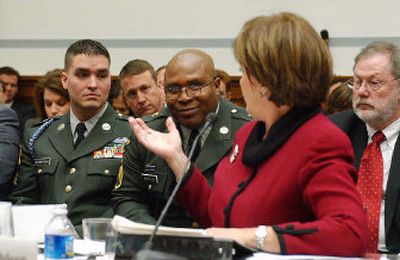Louisiana defends actions after Katrina

WASHINGTON – Criticism by GOP lawmakers of Louisiana’s response to Hurricane Katrina may be aimed at denying the state the federal help it’s asking for, Louisiana Gov. Kathleen Blanco said Wednesday.
“My fear is that this is all aimed at not giving us the resources we need,” Blanco said after three hours of tough questioning by members of the House Select Committee on Hurricane Katrina.
Committee member Henry Bonilla, R-Texas, said many lawmakers are being told by constituents that they don’t want more federal aid to go to the Gulf region “without accountability.” “There is a lot of Katrina fatigue,” Bonilla said.
But Blanco said the state urgently needs more money. “If Congress fails to help, our people will have no money to rebuild,” she said.
Also Wednesday, the select committee’s chairman, GOP Rep. Tom Davis of Virginia, issued a subpoena for documents related to the Defense Department’s response to Katrina. The committee, which has requested hundreds of thousands of documents from federal and state agencies, plans to issue a report Feb. 15.
On Wednesday, it focused on the actions of Louisiana’s leaders before and after the storm killed about 1,100 people in Louisiana. Blanco and other Louisiana officials defended the state’s performance.
“We did everything we could,” Blanco said.
Bonilla and other Republicans on the committee repeatedly asked Blanco and New Orleans Mayor Ray Nagin, both Democrats, why a mandatory evacuation order wasn’t issued before Aug. 28, the day before the storm hit.
“We should continue to ask what a more successful response would have looked like,” Davis said. “I can’t believe it’s simply accepting as inevitable an evacuation process that left at least 70,000 people behind.”
Blanco and Nagin said they considered the evacuation of about 1.2 million people a success. They said people who didn’t leave the city had made up their mind to stay, despite the consequences, and the evacuation order issued the day before Katrina struck on Aug. 29 gave those who wanted to leave plenty of time.
“We urged people to get out with every emotion we had,” Blanco said.
But she acknowledged there were problems. She said the state did not do enough to maintain the levees or make sure first responders could communicate with one another. Blanco said Louisiana officials were reviewing the response to the hurricane and would make improvements before the next hurricane season begins. “Hindsight makes you brilliant,” she said.